PUMPS & FILTERS
Pump
The swimming pool pump is the heart of your swimming pool system, keeping your pool in good health by pumping water in a continuous cycle from the pool through the filter and chemical treatment system (if installed) and back to the pool again.
As one of Brisbane’s most respected swimming pool builders, we use state of the art “variable speed” pumps because they save on running costs and significantly reduce the noise levels associated with a single speed pump.
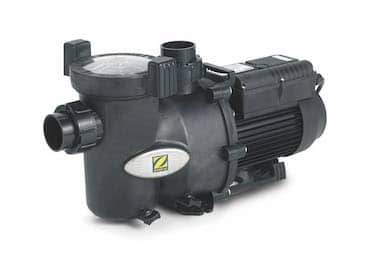
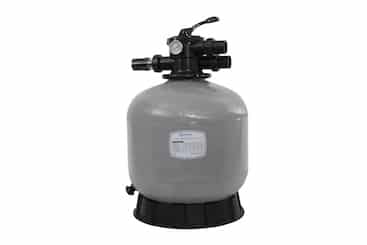
Filter
There are two common types of filter sold in Australia, Sand and Cartridge. Both have their benefits, so it really comes down to personal choice and preference.
Sand filters are still the most commonly used filters in Brisbane pools. Robust, durable and low maintenance, Sand filters can also be filled with different filtration media such as recycled Glass for better filtration. We use Sand filters in all Eco Pool Solutions systems.
Cartridge filters use less water and filter finer particles than Sand filters. They are great in that they use less water flow and less energy to filter your swimming pool water, but they are a little more cumbersome to clean than the Sand Filter.
SANITATION/OXIDATION
Sanitation is the process of destroying harmful organisms. These organisms, referred to as pathogens, include bacteria, fungi, viruses, etc. Chlorination also controls algae (which are not usually harmful themselves, but may harbor pathogenic organisms). In addition to being unsightly, algae can cause the surfaces around the swimming pool to become slippery and unsafe.
Oxidation is the process of chemically removing organic debris, such as body waste, particulate matter and perspiration, from the water. The process is similar to burning trash in air. It is important to know that enough chlorine in water will chemically “burn” impurities.
There are many alternatives on the market to sanitise and oxidise your swimming pool (Dosing Systems, Ionisation/UV etc), with the Salt Water Chlorinator still the most popular system for Brisbane swimming pool owners.
We offer an alternative to the standard salt water pool using a slightly different system of Magnesium Minerals. It’s called the Magna Pool System. The Magna Pool’s revolutionary blend of minerals provides pool water that is a healthier and is a more environmentally friendly alternative to traditional salt water or manually chlorinated pools.

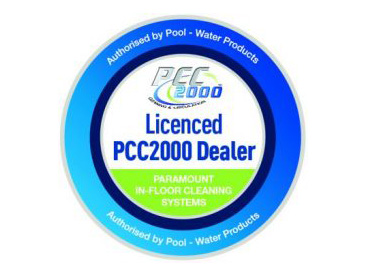
Infloor Cleaning System
This is the ultimate way to clean and circulate your swimming pool. Eco Pool Solutions proud to be one of selected swimming pool builders in Brisbane to hold a Licence to install the Paramount PCC2000 system.
The PCC2000 Cleaning & Circulation System keeps your pool clean and healthy with a virtually invisible, automatic dirt and debris removal system designed specifically for each individual pool or spa. PCC2000 is a system that is custom engineered (through the use of CAD engineering software) specifically for the pool you create. The pop-up spray nozzles are built into your swimming pool during construction, and will clean steps, benches, fountains, walls and spas, allowing you flexibility when designing your pool shape.
The pop-up nozzles push debris from every corner of your pool to the “Patented Collection Zone”, which is an area that stretches across the deepest part of the pool, and from here the debris is directed to the active main drain. The waste then moves to the debris containment canister designed for convenient poolside access.
The Brisbane weather conditions and other environmental factors can impact the maintenance and management costs of a swimming pool. Both heat and chemicals escape the water more rapidly at the surface of the pool due to evaporation. Whilst it is impossible to stop, it can be significantly reduced by returning heated and chemically treated water to the floor of the pool. As the pop-up nozzles push the water towards the collection point, the water is continually circulated, resulting in lower heat and chemical losses and lower costs for you over the life of your pool.
Suction Cleaners
Suction cleaners are designed to attach to a skimmer box via a Vacuum Plate. They are powered by the suction of your filtration pump, vacuuming the floor in a random pattern picking up debris and placing it in the skimmer basket.
While this form of cleaner is still found in most swimming pools in Brisbane, they do however compromise the ability of your skimmer box to be able to do its job of skimming the water surface of debris before it falls down slowly through the water column.
Heavy leafed areas are not an ideal environment for a suction cleaner, as swimming pool builders we recommend the PCC2000 InfloorCleaning System or a Robotic Style Cleaner, as a better, more efficient option.
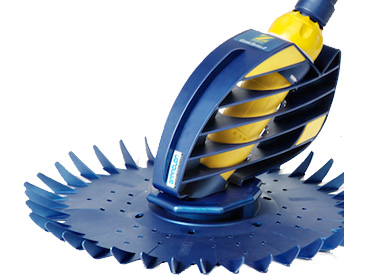
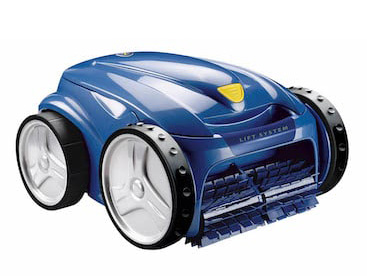
Robotic Cleaners
Robotic cleaners work independently from the swimming pool filter and pump and are driven by an electric motor inside the unit. They are self-contained, collecting debris in a bag or cartridge within the cleaner. Robotic pool cleaners have built-in intelligence that ensures they don’t get stuck in corners and on steps and provide better coverage than suction cleaners.
One of the best features of a robotic swimming pool cleaner is that once it’s finished, you just remove it from the pool. It frees up more room for swimming without pool hoses.
Robotic cleaners are not always the best cleaning solution for every pool. If for example your swimming pool area has lots of fine debris such as sand and silt, we recommend Infloor Cleaning Systems or the Suction Cleaner option.
HEATING
Heating your swimming pool or spa will extend your swimming season beyond the summer months to all year round. It helps you get maximum enjoyment out of your pool.
As swimming pool builders and designers, there are three common heating options we discuss with clients and the decision really comes down to a pool owners’ expectations around how often they want to enjoy the pool or spa.


GAS
Gas heaters are best for heating smaller volumes of water quickly, as they use direct and constant heat from a flame either through natural gas (from the Street) or LPG Bottles. Gas heaters are used with spas, because they give you the flexibility to reach temperatures of up to 40 degrees from a startup temperature that could be a low as 10-12 degrees, in just a few hours.
HEAT PUMP
Heat pumps use the same principle as reverse cycle air conditioners. They extract heat from the air (even down to sub zero temperatures) and, through a series of compression and transference technology, heat the pool water.
This technology is extremely cost effective in terms of running costs. In a side-by-side comparison, a heat pump will cost around 60% less to run than a gas heater, making pumps perfect for pool owners wanting to use their swimming pool 24/7, 365 days a year.
One key advantage of a heat pump over a solar system, is that they still work in cold or overcast conditions, and even at night. When used in conjunction with a solar or thermal blanket, a small heat pump can cost as little as a few dollars per day to run.

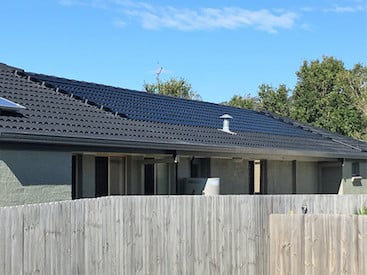
SOLAR HEATING
Using the Sun’s energy, once solar is installed your pool will be heated for cs1 “FREE” (please note that usually a dedicated water pump is used to circulate the water through the system). The cool water from the pool is pumped up to the home’s roof, heated by the solar matting and returned to the pool at a much warmer temperature.
It is important to have realistic expectations with solar heating because it usually can only extend your swimming season (depending on ambient temperatures) by two to three months. Once the Brisbane over-night time temperatures begin to drop, whatever heat gain made during the day you will lose overnight, so the pool won’t be heated until the sun gets to work.
When installing a solar system you are ideally trying to achieve 100% coverage. This mean replicating the surface area of the Pool (8x4m Pool = 32m2 of Matting) on your roof. We’ve seen more and more situations where the best aspect (North) is being taken up by Solar Energy Systems, and while we can look at alternative aspects the system will be less effective.
